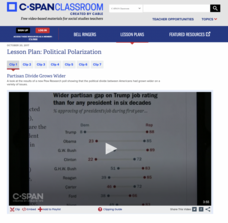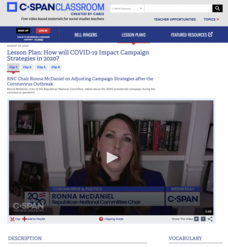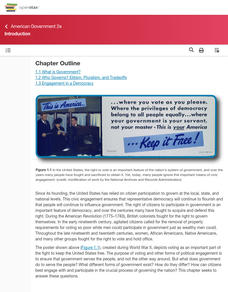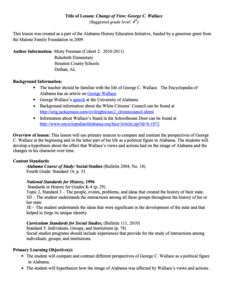College Board
Civic Knowledge and Action in AP U.S. Government and Politics
Vote, it's your civic duty! The high school lesson focuses on voter turnout and civic participation with a series of activities. Young scholars analyze data to discover voter turnout trends, complete worksheets, and participate in group...
C-SPAN
Political Polarization
Dive into the political breach with pupils and explore the reasons for political polarization. Using clips from C-SPAN that include discussions from reporters and scholars, class members consider what is causing the political fault lines...
C-SPAN
Why Do Americans Not Vote in Elections?
In an age of inflamed politics, who votes, who doesn't vote, and why are the questions everyone is trying to answer. Pupils listen to scholars, journalists and data crunchers on voting statistics to make their own conclusions. A chart...
C-SPAN
How will COVID-19 Impact Campaign Strategies in 2020?
While COVID-19 has changed almost everything about daily life, it's also had a tremendous impact on the 2020 presidential contest. Using video clips featuring political advisors from both sides of the aisle, learners brainstorm what they...
Encyclopedia Britannica
Candidate Reflection Essay
After writing about which of the 2020 presidential candidates the class has researched most closely represents their ideas, young political scientists take a 2020 Presidential Election Candidate Quiz to determine what candidate they in...
C-SPAN
What Are Ways for Youth to Engage in Politics?
Help young people become excited to participate in politics. High school historians participate in an engaging lesson focused on ways for youth to become involved in government. Scholars review articles, videos, and essential vocabulary...
Constitutional Rights Foundation
The Troubled Elections of 1796 and 1800
Congress does more than create new laws. Political scientists delve into the elections of 1796 and 1800 to understand how political parties, the Electoral College, and personal agendas affected the election process. The resource also...
Constitutional Rights Foundation
Global Warming and the Paris Agreement
Global warming: a political debate or a scientific fact? Young historians read text, complete activities, and participate in group discussion to understand the political debate surrounding global warming and the US decision to withdraw...
Constitutional Rights Foundation
Elections, Money, and the First Amendment
Those who spend the most, win. Academics read informational text, participate in group discussion, and defend campaign reforms to understand the correlation between money, the First Amendment, and election results. The resource explains...
Constitutional Rights Foundation
Winner-Take-All: The Two-Party System
Two's company, three's a crowd. High school historians learn about the Electoral College, a two-party, winner-take-all voting system in the United States. The instructional activity explains the pros and cons of the two-party system,...
Constitutional Rights Foundation
Why Don’t More People in the U.S. Vote?
To vote or not to vote, that is the question. Secondary scholars explore voter turnout in the United States. The resource uses informational text, group discussion, and a worksheet to help academics understand hindrances to voting and...
Constitutional Rights Foundation
Suppressing the Vote
Voting rights have expanded over time, but some voters are still being suppressed. A thought-provoking resource explores the history of voter suppression in the US and efforts to remove roadblocks to voting. Young historians learn about...
Constitutional Rights Foundation
Purged From the Voter Rolls: Husted v. A. Philip Randolph Institute
Once a registered voter isn't always a registered voter. Academics explore the topic of voter registration and hindrances to remaining registered. The resource focuses on data analysis, federal voter registration law, and Supreme Court...
Curated OER
Election of 1864
An interesting lesson plan uses a hands-on-activity and group discussion to explore the 1864 presidential election and Lincoln's plans for ending the Civil War. Designed for high school, the resource also requires historians to...
Stanford University
Explosion of the Maine
An intriguing lesson features newspaper articles to help academics understand the political impact of the sinking the Maine and how the American media depicted the event. Scholars also view a presentation, participate in group...
American Battlefield Trust
Southern Secession and Abraham Lincoln’s Presidential Election
President Abraham Lincoln: a true humanitarian or a savvy politician? The lesson focuses on Abraham Lincoln's presidency and the secession of the southern states. Academics interpret how Lincoln's presidential platform promoting African...
Rice University
American Government 2e
An informative resource provides a textbook on American government that covers topics such as the definition of government and how democracy works. Each section provides brief questions at the end to assess scholars' understanding.
National Constitution Center
Separation of Powers
Learners explore how the Constitution provides for separation of power and limited government, as evidenced by the three branches of government. They participate in role-playing situations, group discussions, and complete worksheets to...
Northeast Georgia Regional Educational Service Agency
The American Revolution
An empowering lesson explores the causes and complaints that led to the American Revolution. Young scholars, starting in fourth grade, complete hands-on activities, role play, and create cartoons to understand the American Revolution and...
Smithsonian Institution
The American Presidency: Grades 4-6
An interesting unit explains the American presidency from the campaign trail all the way to the role of the president. Historians participate in discussions, create posters, conduct Internet research, and more to gain an understanding of...
Pace University
Jacksonian Democracy
Jacksonian Democracy ... a total success or a complete failure? Young academics examine Jacksonian Democracy, including the concept of the supremacy of the federal government and the forced relocation of Native Americans. Scholars...
Alabama Department of Archives and History
Change of View: George C. Wallace
Who exactly was George C. Wallace? A great lesson plan provides young historians with a hands-on activity, direct instruction, and discussion to learn about Wallace, why he was an important figure, and why he changed his mind about...
PBS
Stereotypes vs. Statistics (Grades 4-8)
Stereotypes can be painful if they are used to discriminate against others. Statistics, however, can be helpful in dispelling myths propagated by stereotypes. Using a thoughtful lesson plan, scholars complete graphic organizers and...
New York State Education Department
US History and Government Examination: January 2016
Looking for an exam that uses primary sources to test young historians' analytical muscles? Check out a standardized test that asks learners to answer multiple-choice and essay questions to demonstrate their understanding of American...

























